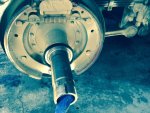You know what they say you're doing when you ASSuME. [no reflection on Swamp Donkey

]
Most of my adult life I've been under the assumption that
- Engine R&D routinely involves TQM methodologies of design, assembly, TESTING, then fielding for "real world" performance data.
- Said R&D would include fluids, additives, filters and MTBF estimation.
- MILSPEC requirements are even MORE stringent than those applying to vehicles/equipment/gewgaws (parts) for general civilian consumption/use/applications.
I know this is wrong. Anecdotally, at least, I just know it is.
Being in the medical field going on 30 years, I've seen what carefully controlled lab condition and clinical trials vs. real world efficacy and side effects are produced. Meds once considered as safe as water (in which umpteen thousands of people drown every year from mop buckets, bath tubs, public pools to oceans in the presence and under the watchful eye of parents and trained professional lifeguards even - so take that simile with a grain of salt, which... don't get me started) get yanked off the market within a year not because of the MED so much as OTHER things it can interfere with, and the list of "under one per cent" reported side effects from the venerable PDR has ALWAYS interested me more than the "10% - or 30% - of patients report" side effects. Treat a few thousand or hundred thousand people and pretty soon those untoward side effects become a real number - and a real problem.
The best and the brightest, and CDC, FDA, NIH, WHO and other alphabet agencies telling me those meds are "safe" and "effective" don't give me a warm and fuzzy copacetic feeling any more. Especially with what I know about FDA politics and things like Sudafed-PE vs. -PSE or even Mucinex' (alleged) active ingredient or what happened with Baycol or many other once-popular meds.
Anyway...
I've mentioned my sister and brother-in-law own a first year civilian H1 hatchback. It's loaded. Even has AC, which is a must in south Florida. Through heat, MORE heat, humidity, and floods (they don't have the fording kit although I've suggested it - they haven't needed it for 25 years, why get one now?), they've got upwards of 240,000 miles on it.
BIL is a senior airframe and powerplant mechanic (they own several companies on the space coast) and I should ask him what his maintenance schedule has been. And which engine they've got.
More anecdotal information, but it's interesting.
My neighbor has a ten year old Ram diesel with close to 200k miles and it doesn't use a drop of oil.
When I look at ads for used diesel pickups (still thinking about it, although I like my Tacoma, if I won the lottery I'd have a duramax power pack installed), they routinely have upwards of several hundred thousand miles on them "highway miles" (sure, and if you believe that, I have a line on 1,000/acre waterfront property in West Palm Beach for you, just send $100 for details and an investment package). Is this normal?
When's the last time you heard of a military vehicle of the same vintage with similar roots and longevity?
I'm still contemplating a spare engine/transmission to put in a crate in my garage down in TN until I can get around to "blueprinting" it - disassemble, measure, replace, rebuild - then put it aside for my kids to sell off at my estate sale because you just KNOW the rules of the universe favor the prepared, and with one in store I'll likely NEVER have to replace mine. Then again, at the rate I'm going, it'll take about 333 years just to break the 100,000 mile mark, but you never know. Better to have it and not need it, right?
NB










